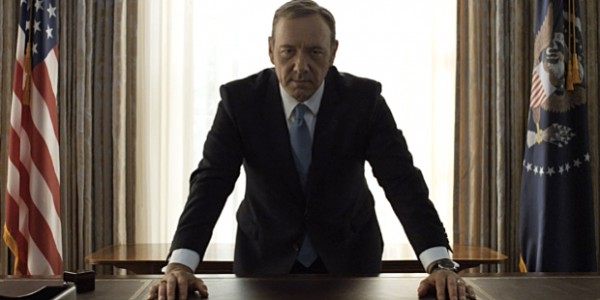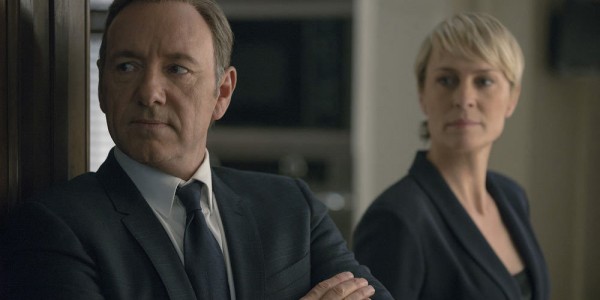House of Cards Might be Great – If it Wasn’t Simply Retelling Macbeth
Like many Netflix subscribers, I spent much of February binge watching the second season of
House of Cards. And, for the most part, I really enjoyed it. Is it over the top and unrealistic at times? Sure. Does binge watching the series help cover up its flaws? Most likely. But I had fun watching the season- particularly the brilliant work of television’s greatest guinea pig, Cashew. (A word of warning: If you haven’t watched season two of
House of Cards, turn back now, as spoilers for the season will be discussed going forward. You have been warned.)
That being said, something struck me about mid-way through the season. I had a major sense of déjà vu. No, I haven’t watched the British version of the series, and I don’t plan to until the America version ends (as I understand that, while different, major plot points are the same in each). Rather, I thought the story arc seemed very familiar. And then it hit me:
House of Cards is
Macbeth. Like, it’s the story of Macbeth, pretty much beat for beat, but with higher production values and a more starry cast than in most stage productions. A modern retelling of the story set in Washington D.C. (fun fact, the Chicago Shakespeare Company put on an excellent production of Macbeth several years ago that was, you guessed it, set in the U.S. government - so, it’s certainly not the first time this has happened).
Now, there’s nothing wrong with using
Macbeth,
Hamlet, or any other Shakespeare play as the frame for a film or television series. In fact, there have been a whole host of excellent shows and films that have done just that. And that
House of Cards draws from
Macbeth isn’t anything of a shock, since the producers have admitted the play (as well as
Richard III) are influences. But what annoyed me this season was how the story arc was so completely tied in with the arc of
Macbeth. It’s one thing to use source material as an influence, but it’s another to tie so completely to a source’s narrative structure that the new series fails to break new ground.

For those whose memories of high school English might be a bit foggy, here’s the basic breakdown of
Macbeth. Once upon a time, there was Macbeth, a lower ranking general in the Scottish army. He and a friend stumble upon a trio of witches, who tell him that he will rise to a higher rank in the army before becoming king of Scotland. Upon returning from the witches, Macbeth is told he has risen in title, due to the death of the previous title holder for treason. Macbeth muses that perhaps the witches were onto something, and, with the urging of his wife (the aptly named Lady Macbeth), Macbeth kills the king so that he can rise to the position. Naturally, nothing good comes of this, and (spoiler alert!) Macbeth eventually falls from power, dying at the hands of the (morally good) Macduff.
Did any of that sound familiar? Because, if you’ve seen the first two seasons of
House of Cards, it really should. Frank is, without a doubt, Macbeth. And, while we’ve only seen glimpses of the hardness and drive for power that exists within her, Claire is Lady Macbeth. And the
House of Cards plot? Well, Frank started out as the House Majority Whip (a minor general), rose to Vice President (through the misfortune of another), and has finally ascended to the position of President (by effectively killing the king). I have absolutely zero doubt that by the end of next season (or, in case Netflix wants to draw things out a bit more, by the end of season four), Frank and Claire will have fallen from their height of power.

Now, there were two things that contributed to Macbeth’s fall. First, Macbeth (and his wife) was a poster boy for the trait of hubris. He believed that no one had the power to outmatch his wit and power. Well, Frank seems to be filled to the brim with his own pride, declaring that he has earned this position and reveling in his ability to take down Tusk (who, in the grand scheme of things, didn’t really pose too much of a threat). The smile Frank gives in the season’s final shot is reason enough to worry (for those who are still rooting for the Underwoods – a subset of the population who I assume are the same as those who were still on the Walter White bandwagon at the end of
Breaking Bad) that perhaps Frank’s pride will go before his fall. And if you don’t think Frank is going to take a spectacular fall, you are in for a big surprise.
The other element that led to Macbeth’s downfall was his refusal to accept the realities that surrounded him. Tied closely with his hubris, Macbeth had been warned that he would fall from power “when Birnam Wood comes to Dunsinane.” So, when it appeared that trees from the wood were indeed coming to Dunsinane, Macbeth refused to accept the truth of the situation and continued to profess his right to rule and his inability to be beaten.

Granted, this hasn’t yet happened to Frank in his never ending quest for power and notoriety, but I have a strong suspicion that season three will include some of Birnam Wood making its way toward the White House. After all, Rachel is somewhere out in the ether. Gavin, the hacker, is mere steps away from putting two and two together regarding Rachel, Doug, and Lucas. And Doug, the only one who really knew the extent of Gavin’s knowledge and how crucial it is to keeping Frank safe? He’s dead in the woods. Who wants to bet that Birnam Wood is coming to the White house in the form of a hacker and a former call girl? After all, they both have the power to topple Frank.
Now, could
House of Cards completely divert from following the
Macbeth story arc? Of course, and we won’t know how close they stay or if they stray until next February at the earliest. A huge part of me hopes I’m wrong about all my predictions and that the writers take things in a completely different direction. But, the realist in me has a sinking feeling that the series might now be far too closely tied to the narrative path it’s on to divert itself. And is that really such a bad thing? I’m not sure. For a show that has been lauded by critics and the television industry to the extent that
Cards has been, I can’t help but wish it had the guts to really try to be original. After all, doesn’t Frank Underwood admire those who can think outside the box?
 For those whose memories of high school English might be a bit foggy, here’s the basic breakdown of Macbeth. Once upon a time, there was Macbeth, a lower ranking general in the Scottish army. He and a friend stumble upon a trio of witches, who tell him that he will rise to a higher rank in the army before becoming king of Scotland. Upon returning from the witches, Macbeth is told he has risen in title, due to the death of the previous title holder for treason. Macbeth muses that perhaps the witches were onto something, and, with the urging of his wife (the aptly named Lady Macbeth), Macbeth kills the king so that he can rise to the position. Naturally, nothing good comes of this, and (spoiler alert!) Macbeth eventually falls from power, dying at the hands of the (morally good) Macduff.
Did any of that sound familiar? Because, if you’ve seen the first two seasons of House of Cards, it really should. Frank is, without a doubt, Macbeth. And, while we’ve only seen glimpses of the hardness and drive for power that exists within her, Claire is Lady Macbeth. And the House of Cards plot? Well, Frank started out as the House Majority Whip (a minor general), rose to Vice President (through the misfortune of another), and has finally ascended to the position of President (by effectively killing the king). I have absolutely zero doubt that by the end of next season (or, in case Netflix wants to draw things out a bit more, by the end of season four), Frank and Claire will have fallen from their height of power.
For those whose memories of high school English might be a bit foggy, here’s the basic breakdown of Macbeth. Once upon a time, there was Macbeth, a lower ranking general in the Scottish army. He and a friend stumble upon a trio of witches, who tell him that he will rise to a higher rank in the army before becoming king of Scotland. Upon returning from the witches, Macbeth is told he has risen in title, due to the death of the previous title holder for treason. Macbeth muses that perhaps the witches were onto something, and, with the urging of his wife (the aptly named Lady Macbeth), Macbeth kills the king so that he can rise to the position. Naturally, nothing good comes of this, and (spoiler alert!) Macbeth eventually falls from power, dying at the hands of the (morally good) Macduff.
Did any of that sound familiar? Because, if you’ve seen the first two seasons of House of Cards, it really should. Frank is, without a doubt, Macbeth. And, while we’ve only seen glimpses of the hardness and drive for power that exists within her, Claire is Lady Macbeth. And the House of Cards plot? Well, Frank started out as the House Majority Whip (a minor general), rose to Vice President (through the misfortune of another), and has finally ascended to the position of President (by effectively killing the king). I have absolutely zero doubt that by the end of next season (or, in case Netflix wants to draw things out a bit more, by the end of season four), Frank and Claire will have fallen from their height of power.
 Now, there were two things that contributed to Macbeth’s fall. First, Macbeth (and his wife) was a poster boy for the trait of hubris. He believed that no one had the power to outmatch his wit and power. Well, Frank seems to be filled to the brim with his own pride, declaring that he has earned this position and reveling in his ability to take down Tusk (who, in the grand scheme of things, didn’t really pose too much of a threat). The smile Frank gives in the season’s final shot is reason enough to worry (for those who are still rooting for the Underwoods – a subset of the population who I assume are the same as those who were still on the Walter White bandwagon at the end of Breaking Bad) that perhaps Frank’s pride will go before his fall. And if you don’t think Frank is going to take a spectacular fall, you are in for a big surprise.
The other element that led to Macbeth’s downfall was his refusal to accept the realities that surrounded him. Tied closely with his hubris, Macbeth had been warned that he would fall from power “when Birnam Wood comes to Dunsinane.” So, when it appeared that trees from the wood were indeed coming to Dunsinane, Macbeth refused to accept the truth of the situation and continued to profess his right to rule and his inability to be beaten.
Now, there were two things that contributed to Macbeth’s fall. First, Macbeth (and his wife) was a poster boy for the trait of hubris. He believed that no one had the power to outmatch his wit and power. Well, Frank seems to be filled to the brim with his own pride, declaring that he has earned this position and reveling in his ability to take down Tusk (who, in the grand scheme of things, didn’t really pose too much of a threat). The smile Frank gives in the season’s final shot is reason enough to worry (for those who are still rooting for the Underwoods – a subset of the population who I assume are the same as those who were still on the Walter White bandwagon at the end of Breaking Bad) that perhaps Frank’s pride will go before his fall. And if you don’t think Frank is going to take a spectacular fall, you are in for a big surprise.
The other element that led to Macbeth’s downfall was his refusal to accept the realities that surrounded him. Tied closely with his hubris, Macbeth had been warned that he would fall from power “when Birnam Wood comes to Dunsinane.” So, when it appeared that trees from the wood were indeed coming to Dunsinane, Macbeth refused to accept the truth of the situation and continued to profess his right to rule and his inability to be beaten.
 Granted, this hasn’t yet happened to Frank in his never ending quest for power and notoriety, but I have a strong suspicion that season three will include some of Birnam Wood making its way toward the White House. After all, Rachel is somewhere out in the ether. Gavin, the hacker, is mere steps away from putting two and two together regarding Rachel, Doug, and Lucas. And Doug, the only one who really knew the extent of Gavin’s knowledge and how crucial it is to keeping Frank safe? He’s dead in the woods. Who wants to bet that Birnam Wood is coming to the White house in the form of a hacker and a former call girl? After all, they both have the power to topple Frank.
Now, could House of Cards completely divert from following the Macbeth story arc? Of course, and we won’t know how close they stay or if they stray until next February at the earliest. A huge part of me hopes I’m wrong about all my predictions and that the writers take things in a completely different direction. But, the realist in me has a sinking feeling that the series might now be far too closely tied to the narrative path it’s on to divert itself. And is that really such a bad thing? I’m not sure. For a show that has been lauded by critics and the television industry to the extent that Cards has been, I can’t help but wish it had the guts to really try to be original. After all, doesn’t Frank Underwood admire those who can think outside the box?
Granted, this hasn’t yet happened to Frank in his never ending quest for power and notoriety, but I have a strong suspicion that season three will include some of Birnam Wood making its way toward the White House. After all, Rachel is somewhere out in the ether. Gavin, the hacker, is mere steps away from putting two and two together regarding Rachel, Doug, and Lucas. And Doug, the only one who really knew the extent of Gavin’s knowledge and how crucial it is to keeping Frank safe? He’s dead in the woods. Who wants to bet that Birnam Wood is coming to the White house in the form of a hacker and a former call girl? After all, they both have the power to topple Frank.
Now, could House of Cards completely divert from following the Macbeth story arc? Of course, and we won’t know how close they stay or if they stray until next February at the earliest. A huge part of me hopes I’m wrong about all my predictions and that the writers take things in a completely different direction. But, the realist in me has a sinking feeling that the series might now be far too closely tied to the narrative path it’s on to divert itself. And is that really such a bad thing? I’m not sure. For a show that has been lauded by critics and the television industry to the extent that Cards has been, I can’t help but wish it had the guts to really try to be original. After all, doesn’t Frank Underwood admire those who can think outside the box?